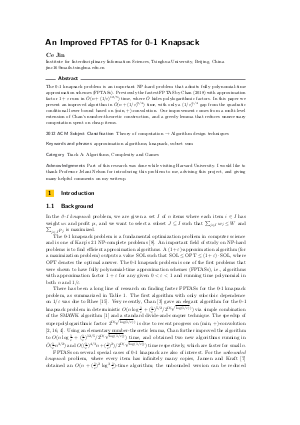An Improved FPTAS for 0-1 Knapsack
Author Ce Jin
-
Part of:
Volume:
46th International Colloquium on Automata, Languages, and Programming (ICALP 2019)
Part of: Series: Leibniz International Proceedings in Informatics (LIPIcs)
Part of: Conference: International Colloquium on Automata, Languages, and Programming (ICALP) - License:
 Creative Commons Attribution 3.0 Unported license
Creative Commons Attribution 3.0 Unported license
- Publication Date: 2019-07-04
File

PDF
LIPIcs.ICALP.2019.76.pdf
- Filesize: 455 kB
- 14 pages
Document Identifiers
Subject Classification
ACM Subject Classification
- Theory of computation → Algorithm design techniques
Keywords
- approximation algorithms
- knapsack
- subset sum
Metrics
- Access Statistics
-
Total Accesses (updated on a weekly basis)
0Document
0Metadata
Abstract
The 0-1 knapsack problem is an important NP-hard problem that admits fully polynomial-time approximation schemes (FPTASs). Previously the fastest FPTAS by Chan (2018) with approximation factor 1+epsilon runs in O~(n + (1/epsilon)^{12/5}) time, where O~ hides polylogarithmic factors. In this paper we present an improved algorithm in O~(n+(1/epsilon)^{9/4}) time, with only a (1/epsilon)^{1/4} gap from the quadratic conditional lower bound based on (min,+)-convolution. Our improvement comes from a multi-level extension of Chan’s number-theoretic construction, and a greedy lemma that reduces unnecessary computation spent on cheap items.
Cite As Get BibTex
Ce Jin. An Improved FPTAS for 0-1 Knapsack. In 46th International Colloquium on Automata, Languages, and Programming (ICALP 2019). Leibniz International Proceedings in Informatics (LIPIcs), Volume 132, pp. 76:1-76:14, Schloss Dagstuhl – Leibniz-Zentrum für Informatik (2019)
https://doi.org/10.4230/LIPIcs.ICALP.2019.76
BibTex
@InProceedings{jin:LIPIcs.ICALP.2019.76,
author = {Jin, Ce},
title = {{An Improved FPTAS for 0-1 Knapsack}},
booktitle = {46th International Colloquium on Automata, Languages, and Programming (ICALP 2019)},
pages = {76:1--76:14},
series = {Leibniz International Proceedings in Informatics (LIPIcs)},
ISBN = {978-3-95977-109-2},
ISSN = {1868-8969},
year = {2019},
volume = {132},
editor = {Baier, Christel and Chatzigiannakis, Ioannis and Flocchini, Paola and Leonardi, Stefano},
publisher = {Schloss Dagstuhl -- Leibniz-Zentrum f{\"u}r Informatik},
address = {Dagstuhl, Germany},
URL = {https://drops.dagstuhl.de/entities/document/10.4230/LIPIcs.ICALP.2019.76},
URN = {urn:nbn:de:0030-drops-106527},
doi = {10.4230/LIPIcs.ICALP.2019.76},
annote = {Keywords: approximation algorithms, knapsack, subset sum}
}
Author Details
Acknowledgements
Part of this research was done while visiting Harvard University. I would like to thank Professor Jelani Nelson for introducing this problem to me, advising this project, and giving many helpful comments on my writeup.
References
- Alok Aggarwal, Maria M. Klawe, Shlomo Moran, Peter Shor, and Robert Wilber. Geometric applications of a matrix-searching algorithm. Algorithmica, 2(1):195-208, November 1987. URL: http://dx.doi.org/10.1007/BF01840359.
- David Bremner, Timothy M. Chan, Erik D. Demaine, Jeff Erickson, Ferran Hurtado, John Iacono, Stefan Langerman, Mihai Pǎtraşcu, and Perouz Taslakian. Necklaces, Convolutions, and X+Y. Algorithmica, 69(2):294-314, June 2014. URL: http://dx.doi.org/10.1007/s00453-012-9734-3.
- Timothy M. Chan. Approximation Schemes for 0-1 Knapsack. In Proceedings of the 1st Symposium on Simplicity in Algorithms (SOSA), pages 5:1-5:12, 2018. URL: http://dx.doi.org/10.4230/OASIcs.SOSA.2018.5.
- Timothy M. Chan and Ryan Williams. Deterministic APSP, Orthogonal Vectors, and More: Quickly Derandomizing Razborov-Smolensky. In Proceedings of the 27th Annual ACM-SIAM Symposium on Discrete Algorithms (SODA), pages 1246-1255, 2016. URL: http://dx.doi.org/10.1137/1.9781611974331.ch87.
- Marek Cygan, Marcin Mucha, Karol Węgrzycki, and Michał Włodarczyk. On Problems Equivalent to (Min,+)-Convolution. ACM Trans. Algorithms, 15(1):14:1-14:25, January 2019. URL: http://dx.doi.org/10.1145/3293465.
- Oscar H. Ibarra and Chul E. Kim. Fast Approximation Algorithms for the Knapsack and Sum of Subset Problems. Journal of the ACM (JACM), 22(4):463-468, October 1975. URL: http://dx.doi.org/10.1145/321906.321909.
- Klaus Jansen and Stefan E.J. Kraft. A faster FPTAS for the Unbounded Knapsack Problem. European Journal of Combinatorics, 68:148-174, 2018. URL: http://dx.doi.org/10.1016/j.ejc.2017.07.016.
- Richard M. Karp. Reducibility among combinatorial problems. In Complexity of Computer Computations, pages 85-103. Springer US, 1972. URL: http://dx.doi.org/10.1007/978-1-4684-2001-2_9.
- Hans Kellerer, Renata Mansini, Ulrich Pferschy, and Maria Grazia Speranza. An efficient fully polynomial approximation scheme for the Subset-Sum Problem. Journal of Computer and System Sciences, 66(2):349-370, 2003. URL: http://dx.doi.org/10.1016/S0022-0000(03)00006-0.
- Hans Kellerer and Ulrich Pferschy. A New Fully Polynomial Time Approximation Scheme for the Knapsack Problem. Journal of Combinatorial Optimization, 3(1):59-71, July 1999. URL: http://dx.doi.org/10.1023/A:1009813105532.
- Hans Kellerer and Ulrich Pferschy. Improved Dynamic Programming in Connection with an FPTAS for the Knapsack Problem. Journal of Combinatorial Optimization, 8(1):5-11, March 2004. URL: http://dx.doi.org/10.1023/B:JOCO.0000021934.29833.6b.
- Marvin Künnemann, Ramamohan Paturi, and Stefan Schneider. On the Fine-Grained Complexity of One-Dimensional Dynamic Programming. In Proceedings of the 44th International Colloquium on Automata, Languages, and Programming (ICALP), pages 21:1-21:15, 2017. URL: http://dx.doi.org/10.4230/LIPIcs.ICALP.2017.21.
- Eugene L. Lawler. Fast Approximation Algorithms for Knapsack Problems. Mathematics of Operations Research, 4(4):339-356, 1979. URL: http://dx.doi.org/10.1287/moor.4.4.339.
- Marcin Mucha, Karol Węgrzycki, and Michał Włodarczyk. Subquadratic Approximation Scheme for Partition. In Proceedings of the 30th Annual ACM-SIAM Symposium on Discrete Algorithms (SODA), pages 70-88, 2019. URL: http://dx.doi.org/10.1137/1.9781611975482.5.
- Donguk Rhee. Faster fully polynomial approximation schemes for knapsack problems. Master’s thesis, Massachusetts Institute of Technology, 2015. URL: http://hdl.handle.net/1721.1/98564.
- Ryan Williams. Faster All-pairs Shortest Paths via Circuit Complexity. In Proceedings of the 46th Annual ACM Symposium on Theory of Computing (STOC), pages 664-673, 2014. URL: http://dx.doi.org/10.1145/2591796.2591811.
